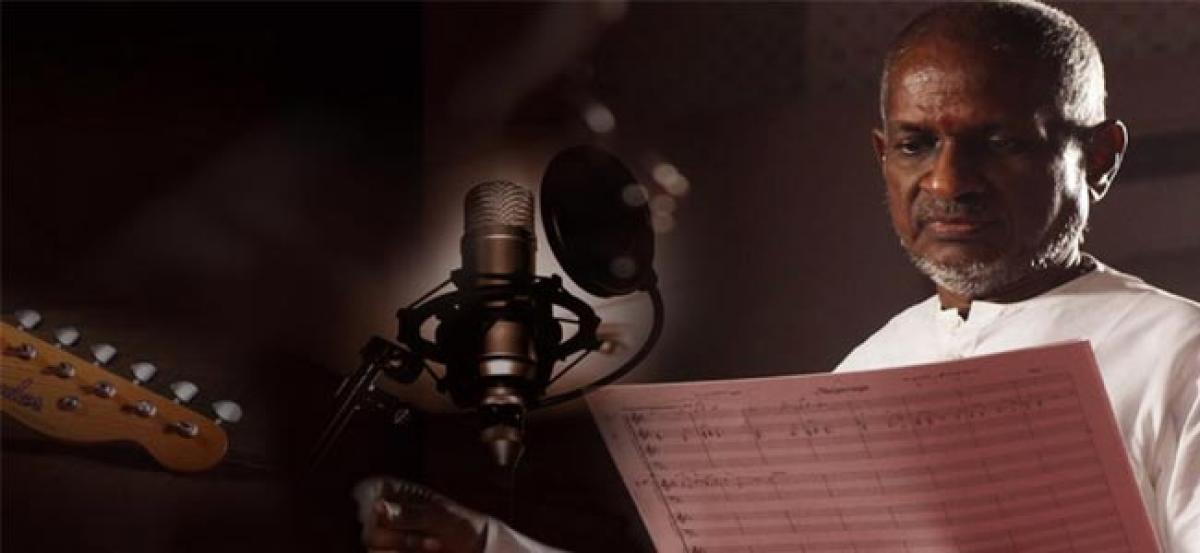Live
- BJP MP candidate Bharat Prasad visited the student who tried to commit suicide
- PM’s popularity in the fast lane: Autos with 'Har Dil Mein Modi' slogan spotted across Delhi
- Delhi-based political parties are like East India Company: Sukhbir Badal
- Golf: Diksha moves into Top-20 at South African Women’s Open
- KCR lashes out against BJP and Congress for destroying Telangana
- Dairy Science students visited the Milk cooling plant
- Moody feels Pant ahead in keepers’ race for T20 WC squad; Srikkanth picks Rahul over Samson as reserve keeper
- Thanking voters for extending 'unparalleled support' to NDA, PM Modi says second phase 'too good'
- Natural Relief for Menstrual Cramps: Beetroot Juice Recipe
- Asha Worker died in a road accident
Just In

Noted music composer Ilayaraja’s legal notice to illustrious singer SP Balasubrahmanyam created uproar amongst the fraternity. According to his legal notice – “If somebody sings his songs then they would be breaking the copyright law and would have to pay hefty amounts as damages”.
Noted music composer Ilayaraja’s legal notice to illustrious singer SP Balasubrahmanyam created uproar amongst the fraternity. According to his legal notice – “If somebody sings his songs then they would be breaking the copyright law and would have to pay hefty amounts as damages”.
SPB is currently in the US as part of his world tour and on his Facebook post termed the incident as “unfortunate” and said that now he would sing songs of other music composers. He further stated that he is “ignorant of these laws”, but will abide by them; which, in a way explains the state of affairs.
It is not just during the many concerts – film songs are used in television serials, online videos and other commercial platforms in India, without any idea that such indiscriminate use is tantamount to copyright infringement.
In fact it is not the first time that Ilayaraja took to law to protect his rights. It may be recalled that three years ago, he approached Madras High Court over usage of his songs for commercial purposes. The Court then had given an injunction against five music labels and ordered them to not use or sell Ilayaraja’s compositions without his permission.
An official from a leading music label comments, “We are very particular when it comes to copyrights issue. Our company has been following a practice of maintaining documentary confirmations from music composers about giving us unconditional rights over the compositions.
Till 2012 June, the music composers need not enter into any agreement with the film producer, who subsequently sells music rights to the label. However, since July 1, 2012, the audio company possesses only 75 per cent of the rights of the songs while 25 per cent of the rights belong to the music composer (if the composer does not give a ‘No Objection Certificate’ (NOC) agreement). There are cases where composers give an NOC, except for a song remix and remake for which, they shall still retain the copyrights.
Ilayaraja was an exception, he never used give the copyrights to the producers or music labels. He retained rights for almost all his compositions.”
Evidently, is it, but, mandatory to obtain the pre-requisite permission or pay royalty before using the songs.
Closer home, Telugu music director RP Patnaik lashed out at TV serials for using songs without permission. He filed a lawsuit against a TV show titled 'Atto Attamma Kuturo', which had used a song from his then-unreleased film ‘Tulasidalam’. It is reported that he demanded Rs 50 lakh as compensation. Many other music composers joined the bandwagon and demanded royalties for usage of the songs.
In recent times, the dynamics have further complicated. Srinivas, an analyst, who has more than a decade of experience in value-added services, states, “Since, we are in an era where the original songs are being replicated in other languages, the original sound track (OST) always holds the key to in such situations.
Generally, a smart music composer will not give the permission for the OST while entering into agreement with the producers, although the latter insists. Since the revenue avenues include caller tunes, ringtones, hello tunes, etc, the composer fears that he might miss the revenue earning opportunity if he gives away the OST.
However, aspiring music composers cannot do the same, fearing that they might not be considered for future films. As a result of this, the relations between producers, composers and music labels are strained. I guess there needs to be a collective effort from all the stakeholders and resolve such tricky situations amicably.”
Much admired film music composer RP Patnaik comments on the news, “Ilayaraja and SP Balu are such good friends, and I am surprised to see the former slapping a legal notice to the latter. I too faced similar situations where TV channels started using my compositions. But since a soap opera is a creative ground and the IP rights belong to me, I found it unfair.
When I decided to slap a legal notice to the TV channels, they all requested me personally not to issue any notice and instead, settle amicably. This is how the entire system is working. Although Indian Performing Right Society (IPRS) is working towards it, we have decided to work be more stringent when it comes to copyrights.”
Sending legal notice surely came as a big snub to SPB, as he is on a tour marking 50 years in the industry; however, it is important that this issue should be brought to table and discussed openly to come up with clear solutions that protects the rights of all the artists involved. It is a tricky issue in India because, while the creator of the film music is important – the role of the lyric writer and the singer cannot be discounted. - With inputs from Sashidhar Adivi.
By Navin Pivhal

© 2024 Hyderabad Media House Limited/The Hans India. All rights reserved. Powered by hocalwire.com







